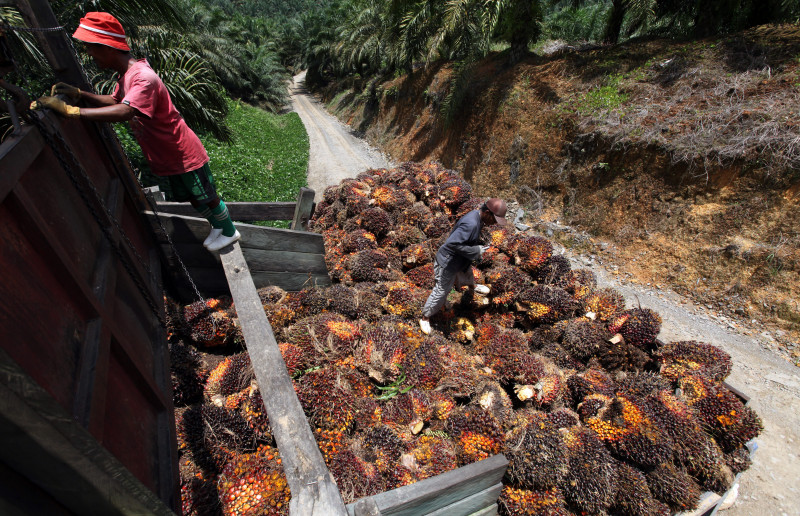Indonesia still mulling sending oil palm plantation workers to Malaysia: deputy minister
Priority now on finalising MoU on recruitment, protection of domestic workers, says Datuk Seri Wee Jeck Seng

Deputy Minister I Datuk Seri Wee Jeck Seng says the shortage of workers for the harvesting and collection of fresh fruit bunches amounted to 25,471 as of August. – FGV pic, December 7, 2021
KUALA LUMPUR – Malaysia is now awaiting consideration from Indonesia on the mechanism to bring in migrant workers for the oil palm plantation sector, said the Plantation Industries and Commodities Ministry.
Deputy Minister I Datuk Seri Wee Jeck Seng said that based on recent discussions with the Indonesian government, the ministry found that the republic is still deliberating on sending its migrant workers to Malaysia even though it had previously agreed to do so.
“Indonesia’s priority is to finalise the memorandum of understanding on the recruitment and protection of Indonesian domestic workers in Malaysia.
“As I said, we depend on foreign workers, and also on source countries that have agreements to send their workers to our country,” he told the Dewan Rakyat today.
Wee was replying to a supplementary question from Nga Kor Ming (Teluk Intan-PH) on the shortage of migrant workers brought in for the palm plantation sector.
Wee added that this obstacle was not only a loss to the palm industry but also to the government’s revenue.
He hoped the process of migrant workers’ entry to the oil palm plantation sector could be expedited to address the sector’s losses.
Answering a question from Nga on the estimated losses due to the shortage of workers in the harvesting and collection of fresh fruit bunches (FFB), Wee said the shortage of workers for these activities amounted to 25,471 as of August.
“With the average productivity for harvesters and collectors being two tonnes of FFB per day, per worker, the total FFB that could not be harvested amounted to 50,942 tonnes per day.
“Taking into account working days of 26 days a month, the estimated FFB that could not be harvested totalled 1.3 million tonnes per month, equivalent to 15.9 million tonnes per year,” he added.
He said at the average price of crude palm oil of RM4,555 per tonne, the loss due to the shortage of employment in August 2021 would amount to RM14 billion per year.
The estimated loss increased 56% and more than 100% compared with 2020 and 2019, whereby loss from the shortage of employment for these years were estimated at RM9 billion and RM6 billion respectively.
Previously, Plantation Industries and Commodities Minister Datuk Zuraida Kamaruddin said Malaysia would receive 32,000 foreign workers in the oil palm plantation sector in October this year. – Bernama, December 7, 2021
KUALA LUMPUR – Malaysia is now awaiting consideration from Indonesia on the mechanism to bring in migrant workers for the oil palm plantation sector, said the Plantation Industries and Commodities Ministry.
Deputy Minister I Datuk Seri Wee Jeck Seng said that based on recent discussions with the Indonesian government, the ministry found that the republic is still deliberating on sending its migrant workers to Malaysia even though it had previously agreed to do so.
“Indonesia’s priority is to finalise the memorandum of understanding on the recruitment and protection of Indonesian domestic workers in Malaysia.
“As I said, we depend on foreign workers, and also on source countries that have agreements to send their workers to our country,” he told the Dewan Rakyat today.
Wee was replying to a supplementary question from Nga Kor Ming (Teluk Intan-PH) on the shortage of migrant workers brought in for the palm plantation sector.
Wee added that this obstacle was not only a loss to the palm industry but also to the government’s revenue.
He hoped the process of migrant workers’ entry to the oil palm plantation sector could be expedited to address the sector’s losses.
Answering a question from Nga on the estimated losses due to the shortage of workers in the harvesting and collection of fresh fruit bunches (FFB), Wee said the shortage of workers for these activities amounted to 25,471 as of August.
“With the average productivity for harvesters and collectors being two tonnes of FFB per day, per worker, the total FFB that could not be harvested amounted to 50,942 tonnes per day.
“Taking into account working days of 26 days a month, the estimated FFB that could not be harvested totalled 1.3 million tonnes per month, equivalent to 15.9 million tonnes per year,” he added.
He said at the average price of crude palm oil of RM4,555 per tonne, the loss due to the shortage of employment in August 2021 would amount to RM14 billion per year.
The estimated loss increased 56% and more than 100% compared with 2020 and 2019, whereby loss from the shortage of employment for these years were estimated at RM9 billion and RM6 billion respectively.
Previously, Plantation Industries and Commodities Minister Datuk Zuraida Kamaruddin said Malaysia would receive 32,000 foreign workers in the oil palm plantation sector in October this year. – Bernama, December 7, 2021
Indonesia's economy is now booming , thanks to Joko Widodo's open and flexible policies.
ReplyDeleteIndonesia has a dark and nasty past, but I have to say, it currently has far more upsides than Malaysia , which is daily sinking deeper and deeper into Race and Religion Supremacist mentality.